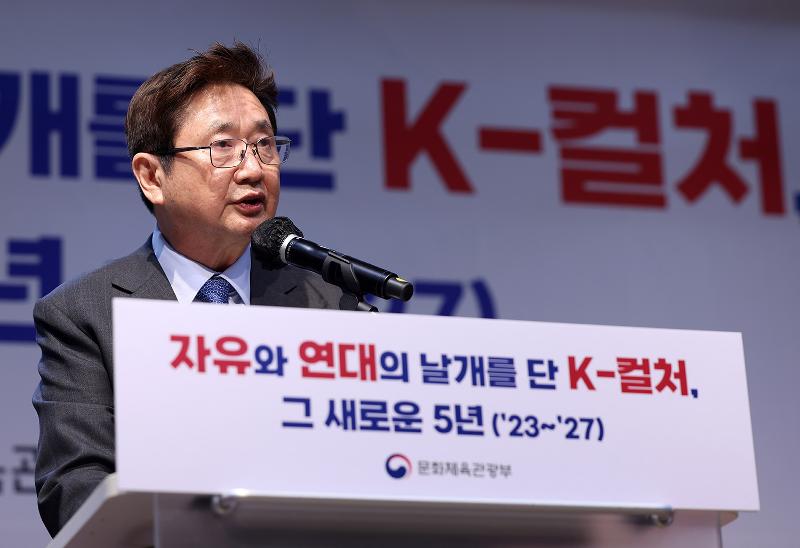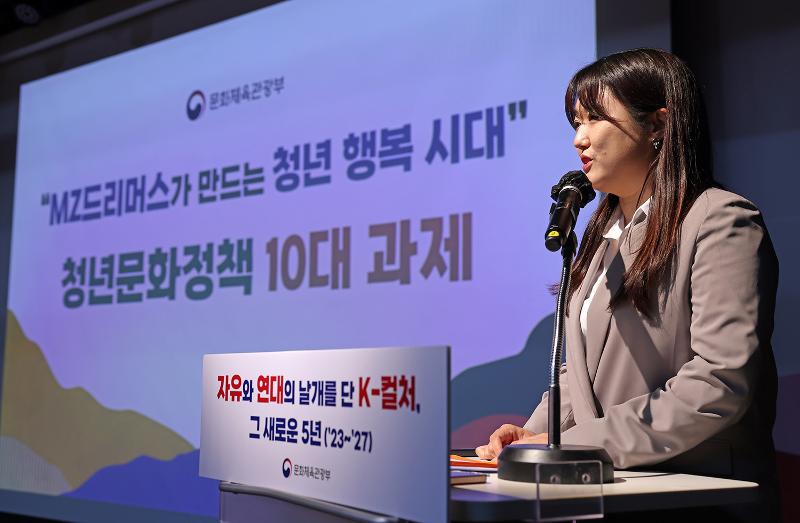
Minister of Culture, Sports and Tourism Park Bo Gyoon on April 11 speaks at a ministry event to announce the second basic plan for cultural promotion and related policy for youth at Ieum Art Hall of Korea Disability Arts & Culture Center in the Daehangno neighborhood of Seoul's Jongno-gu District.
By Yoon Sojung
Photos = Heo Man-jin, Ministry of Culture, Sports and Tourism
The government will offer step-by-step support tailored for youth who start businesses in the traditional cultural sector.
It will also expand the use of a corpus, a language resource comprising a large and structured set of texts, to advance processing technology using artificial intelligence language models for Korean and open the National Museum of World Writing for global script by the first half of the year.
These measures were announced on April 11 as part of the Ministry of Culture, Sports and Tourism's second basic plan for cultural promotion for 2023-27.
The plan set as its core values "freedom" and "solidarity" and "a fair, free and culturally appealing country" as its vision and announced four strategies and 12 related tasks.
To stimulate the emergence of domestic versions of artificial intelligence (AI) language models amid the rapid rise of related AI platforms such as ChatGPT, the ministry will expand the development of a top-quality corpus to a billion words by 2027. This year, it will also host for the first time an expo for the language culture industry covering the traditional language sector like translation and interpretation and linguistic technology and content.
To support projects for senior citizens, disabled people and youth, the ministry by 2027 will have 200 youth startup teams, 100 under three years old and 300 that make big advances within three to seven years after launch.
The plan will also promote outstanding storytellers in their 60s and 70s using oral methods and devise methods of promoting traditional folktales overseas. By 2027, support for sign language interpretation and braille translation will be expanded to up to 2,000 times per year for key announcements by the government or public organizations, and the production of sign language interpretation videos for movies and exhibitions will receive more assistance.
For the dynamic spread of Korean culture, the ministry will expand the sectors for official development assistance for culture to content and sports. The number of Korean Cultural Centers abroad will be raised from 33 this year to 37 in 2027 as bases for spreading culture, and more "Korea Centers" will be opened to link and promote cooperation among culture-related Korean organizations overseas.
Also on April 11, the ministry announced a second basic plan to stimulate leisure and 10 cultural policy tasks for youth to raise the country's continuous leisure participation rate from 35.4% in 2021 to 57% by 2027. For this goal, it will raise the number of "Cultural Wednesday" programs nationwide to 2,300 this year, and to help the public exercise its right to leisure, the number of alternative holidays could be raised through talks with related ministries.
With their necessary policy chosen by the ministry's youth advisory group MZ Dreamers, the 10 cultural policy tasks aim to help the younger generation achieve their dreams, enjoy culture regardless of region or disability and raise life satisfaction. Measures include more first-time support for talented youth when they enter society, spread of generational consensus to add a sense of youth to the value of traditional culture such as popularization of gugak (traditional music) and support for content.
"Because K-Culture's spirit of challenge and sense of original imagination are added to embrace the value of solidarity under the value of freedom, regions, society and global citizens are firmly connected," Minister of Culture, Sports and Tourism Park Bo Gyoon said.
"By attaching the wings of freedom and solidarity to K-Culture, we will systematically push forward policy tasks to take a major step forward as a free, fair and culturally appealing nation."
Held at Ieum Art Hall of Korea Disability Arts & Culture Center in the Daehangno neighborhood of Seoul's Jongno-gu District, the briefing session attracted Minister Park and officials from 11 ministry affiliates and other related entities like the National Institute of Korean Language, National Hangeul Museum and King Sejong Institute Foundation as well as those from MZ Dreamers.
The ministry devised the basic plan for cultural promotion under Article 8 of the Framework Act on Culture. The first plan covered the years 2015-19.

Choi Soo Jie, youth policy adviser to the Ministry of Culture, Sports and Tourism, on April 11 announces the 10 cultural policy tasks for youth at a ministry briefing to announce the second basic plan for cultural promotion and policy for youth at Ieum Art Hall of Korea Disability Arts & Culture Center in the Daehangno neighborhood of Seoul's Jongno-gu District.
arete@korea.kr